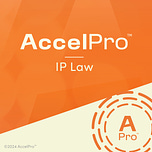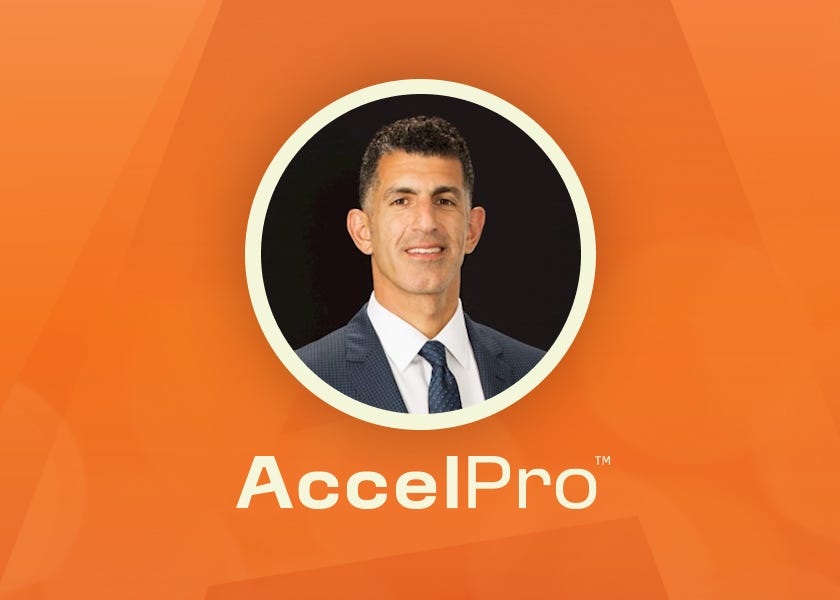Listen on Apple Podcasts, Spotify and YouTube.
Welcome to AccelPro IP Law, where we provide expert interviews and coaching to accelerate your professional development. Today we’re featuring a conversation with Bobby Ghajar, a Partner at Cooley.
In this interview, Ghajar discusses copyright issues brands face on social media, street art and copyright, intellectual property strategies surrounding IPOs and more. Ghajar is especially interested in the use of generative intelligence by brands, as well as issues of intellectual property in the advertising world. He also focuses on how legal teams can use intellectual property due diligence to help organizations before embarking on important business decisions.
As always, our mission is to improve your day-to-day job performance and make your career goals achievable. If your colleagues in the IP Law field might be interested, please let them know about AccelPro. As our community grows, it grows more useful for its members. Thank you for being a member, and happy new year!
Listen on Apple Podcasts, Spotify and YouTube.
Interview References:
Bobby Ghajar’s Cooley profile.
12:30 | Novak, Matt. AI-Created Images Aren’t Protected By Copyright Law According To U.S. Copyright Office. (2023, February 22). Forbes.
12:32 | United States Copyright Office. (2023, February 21). [Letter outlining decision in copyright registration (#VAu001480196) of Zarya of the Dawn].
12:34 | Midjourney. (2024).
Supplemental Materials:
[Major, Lindsey & Africa]. (2023, June 15). Harnessing the Power of Generative AI: Legal and Policy Considerations [Video]. Youtube.
IP Implications of Generative AI. (2023, March 9). Cooley LLP.
Supreme Court Rules Andy Warhol’s Prince Portraits Not Fair Use. (2023, May 18). Cooley LLP.
TRANSCRIPT
I. ON SOCIAL MEDIA CLEARANCES
Neal Ungerleider, Host: Can you give our listeners some background on Cooley and your role there?
Bobby Ghajar: Cooley is a multinational firm with expertise in various subject matters. I'm an IP partner here, and I work in the trademark, copyright and advertising subgroup within IP.
That practice group handles various things–soup to nuts–from trademark issues from clearance around the new brand through registration enforcement. Due diligence all the way through litigation, through jury trials and appeals. And on the copyright side, litigation of all sorts and all sorts of counseling.
I'm resident in the Los Angeles offices. I spend time in both our Santa Monica office and our Downtown LA office, and I've been doing this for roughly 25 years.
NU: From your experiences, what are some of the major copyright and trademark issues brands are facing in the 2020s due to social media?
BG: There are a lot, and some of them are not necessarily new issues. I think every company is concerned about how its marks–its IP–is being portrayed online. And in social media, it can happen very easily and very rapidly. Companies tend to be concerned and interested in making sure that what they put on social media is cleared.
What I mean by that is when they use images, even if it's an image that they got from the internet, there's a certain level of diligence that needs to be done to make sure that it is free and clear to use.
For example, there have been a lot of lawsuits in which copyright owners; sometimes they're photographers, sometimes there are agencies that purport to own copyrights, will write letters to companies based on their use of certain images on their websites and on social media.
One example is clearance of images and content that they put on social media channels. The second is the backlash that can happen through social media and social media campaigns.
Companies are very concerned and interested in how they position their brand to their consumers vis-a-vis social media. I think social media branding and advertising takes a different life than traditional forms of marketing like billboards or commercials or radio ads.
I've seen some cases deal with the use of hashtags. You all know what hashtags are and whether you can tag your posts as a company with your competitor's brand or rival brand. And I think there's a way that companies may be able to do it with minimal risk and there's a way to do it in which case it's dangerous.
I think the other issue that is hot, and we are going to talk about this later today, is fair use: what companies can and can't do with preexisting images… if they modify those images and post them and use them.
In the last five years, I would say, another area of law that I think has gotten more popular–or more scrutiny–is as brands try to urbanize themselves. Maybe reach a broader demographic or portray themselves as cool. You see their social media advertisements. And sometimes their television advertisements portray the product against a backdrop of street art or graffiti art.
I'm very interested in that area. And because you're talking about art that's on buildings. Art that's not on canvas that someone has in their house, but on buildings that all of us can go and look at and observe.
What happens when you, as a company, shoot a video or portray your product with that building and the art in the background? Somebody may own the copyright in that art.
In fact, a lot of cases have found that they do. And therefore companies are accused of making unauthorized use of someone's copyright in the form of the background of a video shoot or photography shoot, or in a social media post.
So those graffiti art slash street art cases, I believe, became a bit more prominent in the last five years. And there have been quite a few of them filed and resolved.
So those are some examples of some issues I've seen due to social media. And the ease with which one can create social media posts advertising and promoting a company. And how quick somebody else can learn of it and potentially raise a claim.
—
II. GOING PUBLIC & GENERATIVE AI COPYRIGHTS
NU: Can you walk us through some of the issues that companies who are either going public, or going through large funding rounds, face in regards to copyright, trademark and IP?
BG: We engage with this quite a bit at my firm and we have a fantastic team of people who do this, day in and day out.
When a company is raising money, considering a sale of assets, a spinoff or acquiring another company, IP due diligence is a critical part of the process. What that means is you need to know what you're getting or you need to know what you're getting into.
Part of that involves disclosures from the company that you may be acquiring or disclosures by the company that we're representing. And we get involved to help with those disclosures.
I think the fun part of what we do is when we get to dig in and do diligence of the IP that a company purportedly owns.
That involves looking to see what kind of trademarks, copyrights, and patents they've registered. What kind of trademarks they've used without registration. Finding out whether third parties might own similar trademarks in the same space, whether there are any pending disputes between the company, and others. And learning more about those cases.
Are they real risks? Are they cases that are going to go away? Have they gone away? How did they settle?
We do due diligence on pending or threatened litigation. Sometimes we're asked to pressure test the IP. So we have colleagues in the patent group that are looking at the patents to really drill down on whether it is a valid patent and whether it's defensible.
We do that from time to time on the trademark side too. And so that whole diligence process is critical to companies that are considering fundraising, and i.e. they are receiving investment, or they're considering investing in another company, or acquiring or selling a company.
NU: And we touched on this a little bit earlier, but how does the rise of easier-to-use visual and audio editing software–and this could be everything from TikTok video editors to generative IP–complicate from the brand perspective, copyright and trademark issues?
BG: I think you touched on a topic that is near and dear to my heart. It's something that I talk to clients and colleagues about everyday.
One of the most powerful tools out there that is encouraging the creation of content, and frightening a lot of companies, is generative AI and the various AI tools and platforms out there. As a firm, we've been talking a lot about those issues. I've done webinars on the subject.
If you are going to use generative AI, what are the risks? What are the opportunities? Who owns what's output from generative AI?
And so it definitely complicates concerns. There's a lot of gray area, and we could talk for 20 or 30 minutes on that subject alone. But I'll give you a few examples of how those tools, including generative AI tools and other filters, complicates things.
For one, when you use an editing tool that does a lot of the work for you and transforms something that you might have created into something different there's an open question as to whether you own those improvements.
In the old days, if you created a drawing–and you used Photoshop, as an example–Photoshop is a popular tool to edit it. Let's say you wanted to remove imperfections. You wanted to accentuate certain lighting. You wanted to change the lighting. You want to change the scale. You wanted to expand certain parts of your drawing; you would do so. No one would ever question whether you were the owner or the author of that work.
For whatever reason, nobody questioned that. That was part of your iteration process. It turned a good image into a great image. It transformed a good image into an image that had maybe different meaning, because you use a digital tool to be able to accentuate it.
Now, suddenly, when you use generative AI to take a concept–it could be a prompt that you write, and turn it into a beautiful image that AI generated. Now there's a different level of scrutiny because it may not be your work. It may have just been the result of a prompt that you gave the AI tool.
“Draw a picture of three people presenting on a podcast and set it in the 1970s and dress them up in very formal wear.” And then it'll create an image of what the generative AI tool thinks that looks like. Your contribution to that process was a nice prompt. In my hypothetical, your contribution was nothing more. And the Copyright Office at least currently has said, in that scenario: what is output by the AI platform is not protectable under copyright.
In sum, the reason for that conclusion is because the human in my hypothetical didn't do much other than contribute a concept, an idea and a very minimally creative prompt. The AI tool did the work, but you didn't know what the AI tool was going to spit out.
You didn't know what the characters would look like. You didn't know what format and configuration it would look like. The AI platform/tool did all the work, and the lack of human control means that a human didn't create it.
The law in our country right now is that a human needs to have created something in order for it to be protected under copyright law. That is an issue that is being discussed daily because so many people want to use tools such as generative AI to create and to enhance.
I think that there's a really interesting middle ground where someone creates a drawing, like in the hypothetical I discussed earlier, and you use generative AI to iterate on it.
I think in that situation you can make a very good argument that you own the copyright in the underlying drawing. You created it. It was original to you, it was novel, and it's fixed. You plugged it into a tool–it could be a very advanced editing tool–or you plugged it into a generative AI platform. Then you enhanced it; you changed it.
I think in that situation, you argue that you are the owner of the underlying work. And you therefore have a derivative interest in whatever is created by the output. Even if the output and the improvements made by generative AI may not be protectable.
So what if you start with one drawing, and generative AI makes it something very different? At a minimum, many would argue you own the underlying work that you fed into the AI tool. And it's an open question whether you owned the many improvements that you architected through the use of an AI tool.
I'm paying short shrift to the discussion that many people are having right now. The Copyright Office has been presented with one example–there was an author who created a comic book, and used the Midjourney AI platform to create all the images for the comic book and refined those images themselves after the Midjourney platform had created the images. They organized them in a certain way, wrote the text of a comic book, and then tried to register it. And to make a very long story short, the Copyright Office said, “You are not entitled to a copyright registration in the comic book, except for your arrangement of images and the text that you wrote.”
But as to all the images, they're beautiful images created by Midjourney. Through your prompts and refined by you, you don't own them. Now others are trying to challenge what the copyright office will and will not grant protection over.
For example, that same author is trying to register a work that they created. So the drawing they created, and then had Midjourney or another AI tool enhanced to create a more realistic version of what they've drawn. As of today, I'm not aware that the Copyright Office has ruled on that registration.
Many others are going to test what the copyright office will and will not allow in terms of content, or creative output that was enhanced or created in part using AI. So that is a topic that is very popular right now, and it is transformative of our industry in many ways.
We have ownership and authorship requirements, minimum creativity required, how you test to see whether things are infringing–we have the framework. But the ease with which people can create content at a click of a button, using AI, is really challenging a lot of business practices that people have engaged in for years. The Copyright Office, going back to them, has said, “If you use AI in any way to create a work, you need to let us know.” There's a disclosure requirement.
It's been fascinating to be on the front lines of this new technology, and the way it's challenging our laws. There's been talk about amendments to our laws, and certainly a lot of chatter around AI regulations. I find that fascinating and I think that is creating opportunities and concerns for companies.
—
III. CAREER PATHWAYS TO IP LAW
NU: What first made you interested in IP law as a specialty?
BG: This is a fun one to answer. Everybody has their own career path, and the way that they ended up in law varies.
I was a hiring partner for a prior firm and interviewed hundreds of people. And I would ask a question like that, “How did you get into law?”
The answers would be fascinating. Sometimes they had family in law, and they were one of many in a long line of attorneys in the family. I am the son of immigrant parents. Nobody in my family had gone to law school, even in their native country.
I was going to be the first in my family to go to law school.
I wanted to be a lawyer at a very young age. I don't know if it was a TV show that captivated me. I don't know if it's my culture that my family encouraged me to go into either law or medicine or be an engineer. There are several immigrant cultures that push their young ones into those careers.
But I wanted to. I didn't do it because anybody suggested I should. I think I was captivated by the law at a very young age. And even going to college, I knew it was merely a means to an end. I was going to end up in law school.
I didn't find IP law until I was in law school. Now I knew I was interested in the subject of IP. I don't know that I even knew what it was called.
I didn't know what intellectual property was, but I knew I was interested in content. I knew I was interested in brands. I was a consumer, like all of us. As a consumer, you encounter brands, you select products based on brand and brand reputation. Maybe subconsciously, I always appreciated the importance of IP.
I dabbled in computer software programming in college, although I was not a computer science major, and tried my hand as an entrepreneur in business touching on computer consulting. So I was around computer software, computer code, and how do you protect computer code? Through copyright.
So when I went to law school, I didn't have any preconceived notions about what area of law I would get into, but that quickly changed when I took an IP survey course.
And it was the first course I took, maybe to the chagrin of some of my other professors, in which I took a strong interest. And you all know, when you really like something you tend to apply yourself even more forcefully.
So that was the first class, this IP survey class, in which I would regularly raise my hands and volunteer. I could tell that it was something I wanted to learn more about.
Then I followed that up with a computer law class, a copyright class, an advanced copyright class. I was able to get an internship working with the judge, and I would raise my hand for all of the cases that related to IP. The clerks at the time would gladly have me handle them. They didn't want to deal with what they viewed as potentially a more thorny area of the law.
And I worked with a brilliant judge, who unfortunately passed away, Judge Ronald Lew. He allowed–he and his clerks allowed–me to work as an extern on all of the cases that came through the courtroom that were IP related. That started to solidify my interest.
And then finally, I was fortunate to get an internship with 20th Century Fox - which at the time owned all sorts of IP from the Simpsons show, to other TV programming and sports programming - and learned how a company protects and licenses its IP from an in-house perspective.
From there, I was fortunate to get my first job, which is a crazy story in itself, within an IP boutique firm working with some of the biggest brands in the world. I haven't looked back since. So through a series of really neat opportunities, I found IP and have been able to stay in IP since day one. Even before day one, if you count being a clerk.
I tell some associates who come through the firm, if you wanna be a litigator, there are all sorts of things you can litigate. I find that IP litigation is as challenging as any type of litigation. We're all presenting our stories to a court, to a jury. We have to follow the civil rules of the rules of civil procedure; the rules of evidence. But the subject matter is fun–trying a case over logos on shirts, trying a case over the brand of a board game and television series, trying a case over children's programming, litigating cases over misuse of a social media company's brand. They're fun. You can engage with people, and people will say, “Oh, I know that car company. I know that toy brand. I know that computer brand.”
They'll understand why you might want to protect it. Now, reasonable minds can disagree as to whether a rival brand is similar and likely to cause confusion. But it allows you to tell a really fun story that people can relate to as a consumer. And I don't find that to be the case with other areas of law.
It's hard to engage with people when you're talking about a real estate dispute. That's not to say that's a boring area, but it doesn't appeal to a wide audience. And when I've tried trademark cases and copyright cases? Generally the audience, the jury pool or the mock jury, or the people that we present to are interested, and they're engaged. And that's what I love about this area of law.
Listen on Apple Podcasts, Spotify and YouTube.
This AccelPro audio transcript has been edited and organized for clarity. This interview was recorded on May 24, 2023.
AccelPro’s interviews and products accelerate your professional development. Our mission is to improve your day-to-day job performance and make your career goals achievable.
Please send your comments and career questions to questions@joinaccelpro.com. You can also call us at 614-642-2235.
If your colleagues in any sector of the IP law field might be interested, please let them know about AccelPro. As our community grows, it grows more useful for its members.












